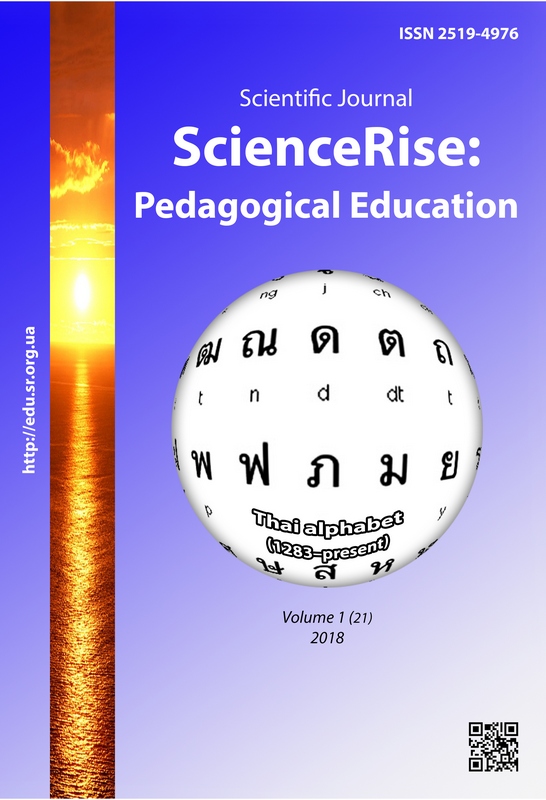European educanion policy in the context of doctoral training quality management
DOI:
https://doi.org/10.15587/2519-4984.2018.121708Keywords:
doctoral education, quality assurance, management, the Salzburg Principles, doctoral education policyAbstract
The doctorate is considered as one of the driving forces to generate economic growth and support positive developments in society, and in the knowledge economy. Therefore, information about the EU doctoral training tendencies can be useful for providing modernization of the national higher education system, the third, PhD level in particular. This paper deals with the political context of European innovative management practices in doctoral training quality assurance.
The article shows that there have been significant changes in doctoral education in Europe in recent years. Political attention increased for doctoral education with its inclusion in the Bologna Process in 2003 as the third level of higher education. In 2005 European University Association adopted the Salzburg Principles and revised these in 2010. The Principles (the core component of doctoral training is the advancement of knowledge through original research; embedding in institutional strategies and policies; the importance of diversity; doctoral candidates as early stage researchers; the crucial role of supervision and assessment; achieving critical mass; duration; the promotion of innovative structures; increasing mobility; ensuring appropriate funding) establish a framework for doctoral education in the Bologna Process based on research embedded in institutional strategies and the creation of structures to support doctoral training quality assurance
References
- Jones, M. (2013). Issues in Doctoral Studies – Forty Years of Journal Discussion: Where have we been and where are we going? International Journal of Doctoral Studies, 8, 83–104. doi: 10.28945/1871
- European University Association (2017). The EUA Council for Doctoral Education: Current and future challenges for Doctoral Education in Europe. 25 May 2017. Ljubljana, Slovenia. Available at: https://www.uni-lj.si/mma/.../2017060508512228/ (Last accessed: 10.12.2017)
- Gisemba Bagaka’s, J., Bransteter, I., Rispinto, S., Badillo, N. (2015). Exploring Student Success in a Doctoral Program: The Power of Mentorship and Research Engagement. International Journal of Doctoral Studies, 10, 323–342. doi: 10.28945/2291
- Szadkowski, K. (2014). The Long Shadow of Doctoral Candidate Status. Case Study. Social Work & Society, 12 (2). Available at: http://nbn-resolving.de/urn:nbn:de:hbz:464-sws-61 (Last accessed: 11.12.2017)
- Gatfield, T. (2005). An Investigation into PhD Supervisory Management Styles: Development of a dynamic conceptual model and its managerial implications. Journal of Higher Education Policy and Management, 27 (3), 311–325. doi: 10.1080/13600800500283585
- Hyatt, L., Williams, P. E. (2011). 21st Century Competencies for Doctoral Leadership Faculty. Innovative Higher Education, 36 (1), 53–66. doi: 10.1007/s10755-010-9157-5
- Realising the European Higher Education Area (2003). Communiqué of the Conference of Ministers responsible for Higher Education in Berlin on 19 September 2003. Berlin. Available at: http://www.enqa.eu/wp-content/uploads/2013/03/BerlinCommunique1.pdf (Last accessed: 30.10.2017)
- Conclusions and Recommendations from the Bologna Seminar on “Doctoral Programmes for the European Knowledge Society” (Salzburg, 3–5 February 2005) (2005). Salzburg. Available at: http://orpheus-med.org/images/stories/documents/Salzburg%20Conclusions.pdf (Last accessed: 10.12.2017)
- European University Association (2010). Salzburg II Recommendations. European Universities’ Achievements since 2005 in Implementing the Salzburg Principles. Brussels. Available at: http://www.eua.be/Libraries/publications-homepage-list/Salzburg_II_Recommendations (Last accessed: 10.12.2017)
- European University Association (2016). Doctoral Education – Taking Salzburg Forward. Implementation and New Challenges. Available at: http://www.eua.be/activities-services/cde/the-shape-things-to-come.aspx (Last accessed: 10.12.2017)
Downloads
Published
How to Cite
Issue
Section
License
Copyright (c) 2018 Olha Fast

This work is licensed under a Creative Commons Attribution 4.0 International License.
Our journal abides by the Creative Commons CC BY copyright rights and permissions for open access journals.
Authors, who are published in this journal, agree to the following conditions:
1. The authors reserve the right to authorship of the work and pass the first publication right of this work to the journal under the terms of a Creative Commons CC BY, which allows others to freely distribute the published research with the obligatory reference to the authors of the original work and the first publication of the work in this journal.
2. The authors have the right to conclude separate supplement agreements that relate to non-exclusive work distribution in the form in which it has been published by the journal (for example, to upload the work to the online storage of the journal or publish it as part of a monograph), provided that the reference to the first publication of the work in this journal is included.







